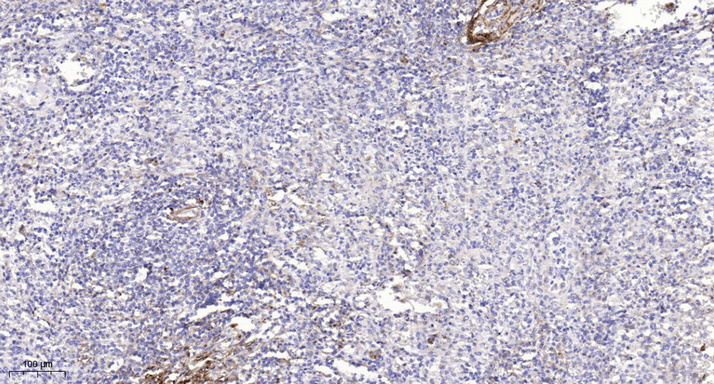Smad1 (Phospho Ser214) rabbit pAb
- Catalog No.:YP1577
- Applications:WB;IHC
- Reactivity:Human;Mouse;Rat
- Target:
- Smad1
- Fields:
- >>TGF-beta signaling pathway;>>Hippo signaling pathway;>>Signaling pathways regulating pluripotency of stem cells;>>Transcriptional misregulation in cancer
- Gene Name:
- SMAD1 BSP1 MADH1 MADR1
- Protein Name:
- Smad1 (Phospho Ser214)
- Human Gene Id:
- 4086
- Human Swiss Prot No:
- Q15797
- Mouse Gene Id:
- 17125
- Mouse Swiss Prot No:
- P70340
- Rat Swiss Prot No:
- P97588
- Immunogen:
- Synthesized peptide derived from human Smad1 (Phospho Ser214)
- Specificity:
- This antibody detects endogenous levels of Human,Mouse,Rat Smad1 (Phospho Ser214)
- Formulation:
- Liquid in PBS containing 50% glycerol, 0.5% BSA and 0.02% sodium azide.
- Source:
- Polyclonal, Rabbit,IgG
- Dilution:
- WB 1:500-2000;IHC 1:50-300
- Purification:
- The antibody was affinity-purified from rabbit serum by affinity-chromatography using specific immunogen.
- Concentration:
- 1 mg/ml
- Storage Stability:
- -15°C to -25°C/1 year(Do not lower than -25°C)
- Other Name:
- Mothers against decapentaplegic homolog 1 (MAD homolog 1;Mothers against DPP homolog 1;JV4-1;Mad-related protein 1;SMAD family member 1;SMAD 1;Smad1;hSMAD1;Transforming growth factor-beta-signaling protein 1;BSP-1)
- Observed Band(KD):
- 51kD
- Background:
- function:Transcriptional modulator activated by BMP (bone morphogenetic proteins) type 1 receptor kinase. SMAD1 is a receptor-regulated SMAD (R-SMAD).,PTM:Phosphorylated on serine by BMP type 1 receptor kinase.,PTM:Ubiquitin-mediated proteolysis by SMAD-specific E3 ubiquitin ligase SMURF1.,similarity:Belongs to the dwarfin/SMAD family.,similarity:Contains 1 MH1 (MAD homology 1) domain.,similarity:Contains 1 MH2 (MAD homology 2) domain.,subcellular location:Cytoplasmic in the absence of ligand. Migrates to the nucleus when complexed with SMAD4.,subunit:Interacts with HGS, NANOG and ZCCHC12 (By similarity). May form trimers with another SMAD1 and the co-SMAD SMAD4. Interacts with PEBP2-alpha subunit, CREB-binding protein (CBP), p300, SMURF1, SMURF2 and HOXC8. Associates with ZNF423 or ZNF521 in response to BMP2 leading to activate transcription of BMP target genes. Interacts with LBXCOR1.,tissue specificity:Ubiquitous. Highest expression seen in the heart and skeletal muscle.,
- Function:
- MAPKKK cascade, skeletal system development, ossification, osteoblast differentiation, urogenital system development, formation of primary germ layer, mesoderm formation, mesodermal cell fate commitment, kidney development, osteoblast fate commitment, transcription, regulation of transcription, DNA-dependent, regulation of transcription from RNA polymerase II promoter, RNA processing, protein complex assembly, defense response,inflammatory response, cell surface receptor linked signal transduction, enzyme linked receptor protein signaling pathway, transmembrane receptor protein serine/threonine kinase signaling pathway, transforming growth factor beta receptor signaling pathway, SMAD protein complex assembly, intracellular signaling cascade, protein kinase cascade, gamete generation, gastrulation, pattern specification process, mesoderm development, negative regulation of cell proliferat
- Subcellular Location:
- Cytoplasm . Nucleus . Cytoplasmic in the absence of ligand. Migrates to the nucleus when complexed with SMAD4 (PubMed:15647271). Co-localizes with LEMD3 at the nucleus inner membrane (PubMed:15647271). Exported from the nucleus to the cytoplasm when dephosphorylated (By similarity). .
- Expression:
- Ubiquitous. Highest expression seen in the heart and skeletal muscle.
- June 19-2018
- WESTERN IMMUNOBLOTTING PROTOCOL
- June 19-2018
- IMMUNOHISTOCHEMISTRY-PARAFFIN PROTOCOL
- June 19-2018
- IMMUNOFLUORESCENCE PROTOCOL
- September 08-2020
- FLOW-CYTOMEYRT-PROTOCOL
- May 20-2022
- Cell-Based ELISA│解您多样本WB检测之困扰
- July 13-2018
- CELL-BASED-ELISA-PROTOCOL-FOR-ACETYL-PROTEIN
- July 13-2018
- CELL-BASED-ELISA-PROTOCOL-FOR-PHOSPHO-PROTEIN
- July 13-2018
- Antibody-FAQs
- Products Images

- Immunohistochemical analysis of paraffin-embedded human spleen. 1, Antibody was diluted at 1:200(4° overnight). 2, Tris-EDTA,pH9.0 was used for antigen retrieval. 3,Secondary antibody was diluted at 1:200(room temperature, 45min).

- Western Blot analysis of various,using primary antibody at 1:1000 dilution. Secondary antibody(catalog#:RS23920) was diluted at 1:10000


